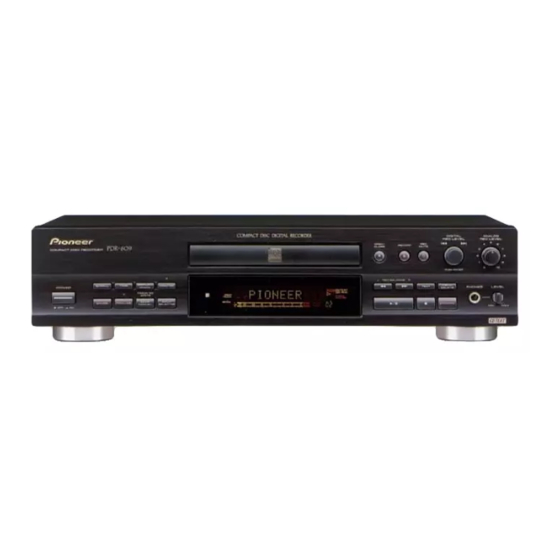Pioneer PDR-609 Instrukcja obsługi - Strona 18
Przeglądaj online lub pobierz pdf Instrukcja obsługi dla Odtwarzacz CD Pioneer PDR-609. Pioneer PDR-609 44 stron. Compact disc recorder
Również dla Pioneer PDR-609: Instrukcja obsługi (44 strony)

4 Getting Started
This generally allows just one generation of digital recording.
In other words, you can make a digital recording from an
original source (such as a commercial CD), but you can't
then make further digital recordings from that copy. Most
digital recording equipment uses the SCMS system, including
CD and MD recorders, and DAT decks. You may also find that
you can't record certain DVD discs as the digital output of the
DVD player can be disabled by the disc.
Of course, if you do encounter SCMS or other digital-copy
restrictions, you can always record through the analog inputs
of the PDR-609. To check whether a source is digital-copy
protected, see Checking for Digital Copy Protection on page
60.
Recording modes
The recorder is equipped with a set of analog input terminals,
as well as both optical and coaxial digital inputs. This means
that the PDR–609 is compatible with almost all audio
sources—analog or digital. It even has a built in sampling
rate converter making it ideal for recording DAT tapes or
satellite broadcasts, for example, which are often at sampling
rates different to that of CD. Since CDs are always recorded at
a sampling rate of 44.1kHz, sample rate conversion is
completely automatic—if the recorder senses a digital signal
at either 32 or 48kHz, it will convert it to 44.1kHz. Note that
this recorder can't convert 96kHz digital sources (such as
some DAT tapes and DVD discs).
Miscellaneous information
• The minimum recordable time is four seconds.
• Usually, track numbers are recorded onto the disc
automatically when recording. If you decide to switch off
this feature (for example, when you're recording from a
satellite broadcast), be sure to input track markers as
recording is taking place—you can't add them after
recording is complete. See pages 33 for more on manual
and automatic track numbering.
• The maximum number of tracks on a disc is 99.
Downloaded From Disc-Player.com Pioneer Manuals
18
Digital recording from DAT
If you're recording a DAT tape that was recorded using the
DAT machine's auto ID function, the IDs on the tape are
slightly after the beginning of the actual recording. This can
cause problems for the CD recorder:
• The start of the track may not be recorded.
• The track number will be recorded on the disc after the
start of the track.
• The beginning of the next track on the DAT is uninten-
tionally recorded.
To avoid these problems, we recommend recording start IDs
on the DAT manually, if possible. If this is not possible, or if
there are no start IDs on the DAT, we recommend using
manual track numbering while recording to CD to ensure
that new tracks are starting in the right places. Refer to the
instructions for your DAT recorder for more information.
You might also encounter problems if you try to synchro-
record all tracks from a DAT that is set to program play. If you
want to record a DAT in program play mode, use the 1-track
synchro recording mode—see pages 20 for how to do this.
Digital signal interruptions
Sources of signal interruption include power or source
component failure, accidental disconnection of the intercon-
nect cord, and interruption of digital satellite broadcasts. In
all these cases, if the signal resumes within about five seconds,
the result will just be a blank section on the disc. If the
interruption is longer than five seconds, the recorder displays
the error message:
DIN UNLOCK
Power interruptions
Never switch off the PDR-609 while it's recording, or while the
display shows
(Program Memory Area Recording).
PMA REC
If there's a power failure, or you accidently disconnect the
power from the wall outlet while recording is in process, you'll
lose at least part of the recording.
After recording, always remove the disc from the recorder
before switching the power off. Failure to do this could result
in you losing some of the recorded material on the disc.
and recording is paused.
